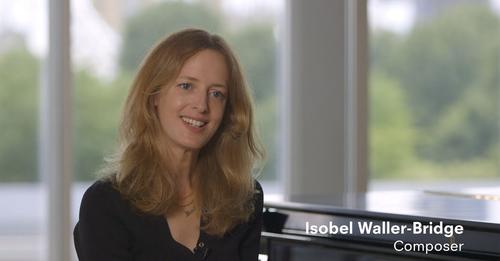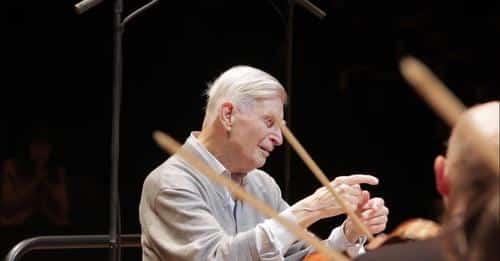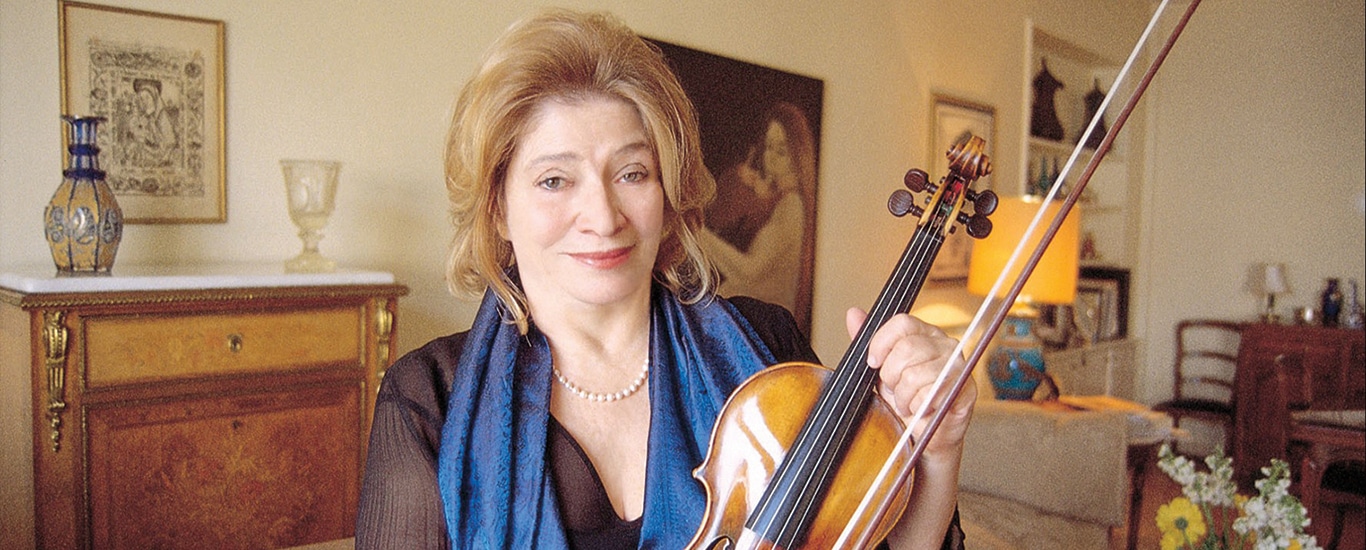Rising temperatures at climate crisis concerts
NewsAlastair Macaulay reviews the latest in the Philharmonia’s fascinating winter series at the Royal Festival Hall:
The Philharmonia Orchestra’s autumn season “Human/Nature” is a triumph of imaginative programming. What can music express? How is man connected with (alienated from) the natural world? How has he depicted it, across Europe and America, over three centuries? New music has become immediately absorbing, old music has often come up new.
It’s also a triumph for Finnish musicians. It’s the debut season of Santtu-Matias Rouvali as the orchestra’s principal conductor; Pekka Kuusisto (conductor, violinist, composer) is its featured musician. On Sunday, Kuusisto played and conducted for not one concerts but two: a programme of four chamber works at the Purcell Room between 6pm and 7pm, followed by a 7.30pm event (lasting over two hours) of musical fare stretching from a world premiere to Vivaldi, ending with an immediate standing ovation. This is a fabulously fresh, unpretentious, versatile, funny musician and public figure.
2. After the world premiere of “Temperatures” last night, conductor Pekka Kuusisto welcomed composer Isobel Waller-Bridge to the stage. pic.twitter.com/lIup58aFlD
— Alastair Macaulay (@AlastairMacaul3) November 29, 2021
The Festival Hall concert opened with the world premiere of the 15-minute “Temperatures” by Isobel Waller-Bridge (elder sister of actress-writer Phoebe “Fleabag” Waller-Bridge – they’re both in their thirties). “Temperatures” imaginatively dramatizes climate change as if from within and yet from changing viewpoints. At moments, its dramatically stressful harmonies recall Vaughan William’s marvellous Antarctica Symphony, with long, powerful chords full of subtle motion and tense change. Next music that has seemed almost devoid of rhythm acquires a febrile pulse. Often – above and beyond any pulse – strings, now high, now low, tremble.
The mind within these dangerous climatic conditions is restless, anxious. Near the end, a march suddenly emerges, gathering force and impetus – and bell sounds add a quality of iridescence. But to what end? All at once this initiative runs out of steam. The weather’s internal motor dies while we listen. Waller-Bridge is a pessimistic conservationist (as am I). But she’s also a new-wave traditionalist. Romantic and modernist forms all percolate her score; here, all of them reach the end of the road.
I grew up close to the East Anglian coast that Britten so uncannily paints in his “Peter Grimes” Four Sea Interludes. Here are birds and deep sea currents, here are sunlight and changing skies above the waves, here’s the vast spread of the seascape that suddenly churns with the storm’s shrieking violence. These pieces are marvels of orchestration. To cite two tiny details: one trumpet trill has shocking explosiveness, while a tambourine very strangely helps to suggest a choppy surface settling down.
In the Festival Hall programme’s second half, Kuusisto spoke, played, and blithely took his audience on an entirely singular and original stream of consciousness. He was leading his own improvisations framing Antonio Vivaldi’s famous “Four Seasons” concerti as violin soloist, playing in close and merry collaboration with Ale Carr, the Swedish cittern player. Kuusisto never talks too much – unless you prefer your maestri entirely voiceless – and he establishes a mood where words and music relaxedly share the same happy ambience. He even describes one section of the Vivaldi as having an “après-ski” mood (and shows why); and his improvisations include musical ideas from Austria, Finland, and Celtic folk music.
This is one engaging, free, spontaneous maverick; his was a “Four Seasons” like no other, effortlessly jumping nations and centuries. His colleague Ale Carr – a cittern is a Renaissance stringed instrument, a relation of the lute – is a kindred spirit, uniting folk and classical, ancient music and modern, with the same enchanting playfulness. (Their quiet encore was a Christmas carol arranged by Jan Sibelius: Kuusisto whistled while he played.)
How many players does the Philharmonia have? It seems that at each concert new players appear; interestingly, the ensemble that played the Vivaldi was about two-third female.
Quite a number of these women and men had been part of Kuusisto’s Purcell Room concert. Its fare, a riveting selection of Scandinavian and Baltic items, could have been called “Northern Lights,” with music by Andrea Tarrodi (Swedish b. 1981), Outi Tarkiainen (Finnish, b. 1985), Erkki-Sven Tüür (Estonian, b. 1959), and Anna Thorvaldsdottier (Icelandic b. 1977). Tarrodi’s “Birds of Paradise” (2008) is all for strings, Tarkiainen’s “Siimes” (2017) all for woodwind, Tüür’s “Conversio” (1994) for violin and piano. Only Thorvalsdottir’s “Hrim” (2009-10) included a wider sonic array – strings, wind, and percussion. This, evoking the formation of near-Arctic forms of frost, proved the most imaginatively poetic of all.
More on Isobel Waller-Bridge:






The debate about the climate crisis, and many symbolic handlings around it, tell us more about human nature than “Human/Nature”.
Just what is our carbon footprint to support our musical institutions? How many trees must be slaughtered and sacrificed to fulfil our quotas of cellos, fiddles, sheet musics, and playbills? How much carbon-spewing energy is wasted mining, refining, alloying, machining and shaping the metals used to create all those trumpets and kettle drums? If you’re concerned about informing the listening public about the issue, I can say with some certainty that anyone who’s to learn about the crisis of climate change through classical music is well educated about the problem. It’s far past the time to put our hollow pablum into inaction so that we may save this earth for generations yet to be born. STOP THE MUSIC! SAVE THE PLANET!
I hope this comment is nothing but “ironic” ..if not…what else must be done to save “YOUR” planet??
It’s not the music, it’s the PEOPLE who are killing the planet. The motto of the climate warriors in reality is “Save the planet – kill yourself.”
Remembering that in the 1970s Brown University wrote to the then President warning him about the coming of another ice age!!! It’s on the public record.
We are actually in an ice age now – the Quaternary. This is an inter-glacial period. When the inter-glacial ends cities like Boston and NY will be under a mile of ice.
“We are actually in an ice age now.”
Nah, just your brain.
I remember that period:winters were tough everywhere in Europe.Ice age was on its way!!!…could be mind you…
The ‘juste milieu’ of mrs Waller-Bridge:
https://www.theguardian.com/tv-and-radio/2020/apr/01/rude-latin-panic-and-sexual-tension-the-art-of-the-tv-soundtrack
Now the intellectuals are giving themselves emotions with dangerous climatic conditions ignorant of the past but happily brainwashed with weather porn
The composer has a myriad of advocacies to make a woke career
Next the viral octet, a celebration of EU intended inoculation schedule
Yet more shameless bandwagon-jumping emotional blackmail – and the tin – (microfibred cloth-) eared always fall for it – who knew?
So, I was at this concert…both of them in the big hall and the Purcell Room. When introducing himself in the smaller Purcell room concert of new music, he said something quite jarring to me – “Thank you all for coming to support new music – remember, all music including Beethoven and Mozart was new once, and if we hadn’t listened then, we wouldn’t be listening to it now”. Is new music so unpopular in London? (I live in Los Angeles where I get to hear mostly new music.) Does new music not get played in London except for specialist settings? Aside from the Waller-Bridge premiere at the 7:30 concert, the only other “new” music I heard in 4 other concerts in the preceding 4 days was the “rediscovered” (hence “new” in scare quotes) Dora Pejacevic Symphony in F# minor with BBCSO.